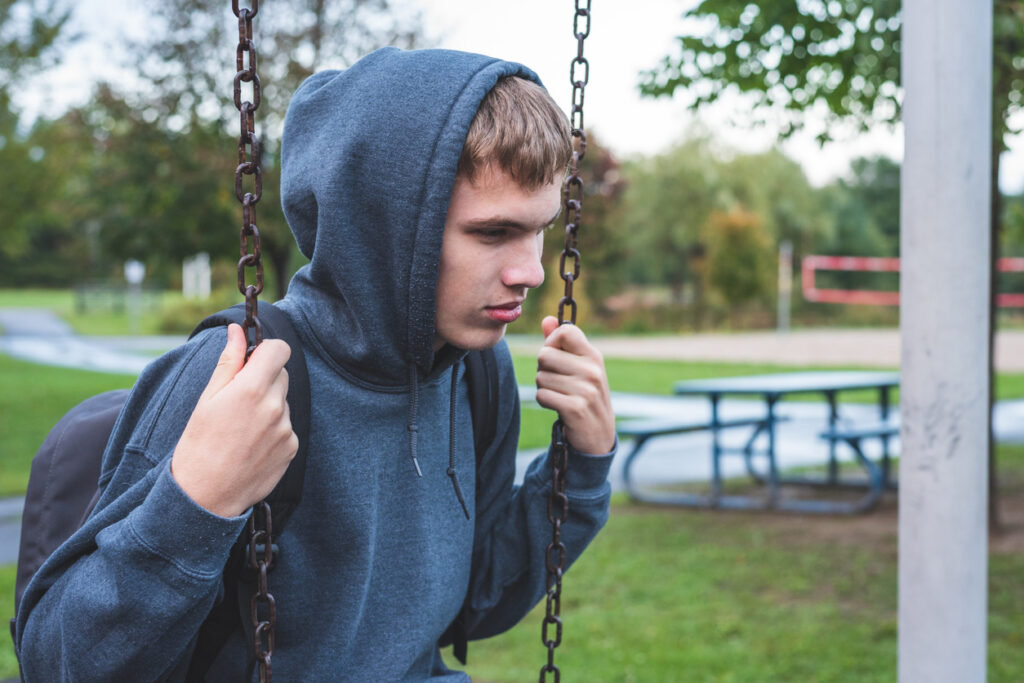Running away from home is a problem behavior, and it could indicate a larger issue with your teen.
If your teen runs away, especially more than once, it increases their risk of developing a host of long-term physical and psychological problems. It also increases the risk of exposure to dangerous behavior from other runaway teens and predatory adults. It’s a problem that should be remedied—fast.
But before we get into the facts and figures, we need to make two things clear. According to the award-winning parenting support site, it’s important to understand that:
- Teens who run away are not bad kids.
- Parents of runaway teens are not bad parents.
The word “bad” is almost never helpful when describing teens, parents, and their relationships. We use it here as shorthand for decisions or behaviors that have negative outcomes, and to counter the voice in your head that may whisper things like this:
“My kid ran away – I must be a bad parent.”
“My kid ran away – maybe my kid is just a bad kid.”
Teens who run away and return often do so to gain power over a situation in which they feel powerless, while parents of teens who run away have often let the parent-child relationship deteriorate to the point where communication is either difficult or non-existent.
That said, we’re not going to sugar-coat the reasons teens run away.
Let’s look at the big-picture numbers on runaways:
- Between 1.6 and 2.8 million teens run away each year.
- Based on current population statistics, that means just under 9% of teens run away each year.
That’s a significant amount, but not an overwhelming percentage. We won’t downplay the gravity of the situation, however. Any time a teen runs away, there’s something going on at home that needs attention.
Why Teens Run Away

We’re not going to sugar-coat the reasons teens run away. A report released by the Missing Children’s Network identifies three primary reasons teenagers run away from home:
- Lack of parent-child communication.
- The inability of the teen to handle their personal problems.
- Mistreatment of the teen by parents or other adults.
Let’s take a closer look at #3 because it’s common to think that most kids who run away are almost always running away from an abusive situation at home.
That’s not necessarily the case.
Data collected by the National Runaway Safeline shows that, of the 33,000 + calls they received in 2016:
- 10% of the callers identified verbal abuse as the reason they left home.
- 7% identified physical abuse or assault as the reason they left home.
- 1% identified sexual abuse as the reason they left home.
We offer these numbers to show that not every child who runs away does so because they’re trying to escape a nightmare scenario at home. As mentioned above, the most common reasons are power and communication. But kids who do run away and spend any time on the streets do indeed put themselves in harm’s way.
Consequences & Risks for Teens Running Away From Home
There are serious consequences of running away from home. Let’s take a look at what can happen to teens once they do run away, and how running away from home correlates with various struggles both in the late teen years and later in life:
[Sources: National Runaway Safeline and The National Conference of State Legislatures]
- 70% of girls who run away report instances of sexual abuse once they’re on the streets.
- 10% of youth in shelters report engaging in survival sex, which is defined as exchanging sex for food, shelter, drugs, or some other subsistence need. This includes prostitution and experiencing adult predators, such as pimps and drug dealers.
- 28% of street youth report engaging in survival sex.
- Teens who run away once decrease their chances of graduating from high school by 10%.
- Teens who run away from home multiple times decrease their chances of graduating from high school by 18%.
- Runaways show an increased risk of emotional disorders, such as anxiety, depression, and suicide attempts.
- Runaways show an increased risk of general health problems.
We present these facts to support our assertion in the first line of this post: if your teen runs away, it’s a problem you need to be actively concerned about. Even if they come back, while they’re out on the street, they’re vulnerable to sexual predators, drug dealers, and peers who already engage in high-risk behaviors.
What to Do When Your Teen Runs Away

Wondering what to do when your teenager runs away? Experts on teen runaways advise the following:
- Search your house and make sure your teen is not hiding somewhere.
- Call the police right away. Contrary to popular opinion, you don’t have to wait 24 hours before reporting your teen as missing.
- Request the investigators to put your child in the National Crime Information Center (NCIC) Missing Persons File. For minors, there is no waiting period for being placed on this list.
- Call every friend, parent, or neighbor you can think of and ask for their help.
- If your teen has a phone and is on your plan, you can check call logs, and in some cases even pinpoint their location using the phone GPS app.
- Search their room for information that might help you find them.
- Call 1-800-786-2929 – The National Runaway Switchboard – and leave a message for your child.
You can also take steps such as making and distributing pictures and posters of your child throughout your local community, contacting any additional state or local missing children’s clearinghouses, or calling 1-800-426-5678 (1-800-I-AM-LOST) to register your child as missing.
How to Ensure Your Teenager Doesn’t Leave Home Without Permission?
Knowing how to stop a teenager from running away requires a well-rounded view of what a teen might be going through in their peer groups and at home, and understanding healthy outlets that help prevent teenagers from leaving home without permission. This ties into why teenagers should work and constructive hobbies for teens.
Does Every State Have Teenage Runaway Laws?
Not every state has teenage runaway laws. In fact, only nine states have these laws in place for minors. Each of these nine states approaches how they handle what happens to a runaway teenager in a different manner, and it is best to look into your specific state for more information on teenage runaway laws.
Does Running Away from Home Go on a Child’s Record?
Once again, each state with teen runaway laws varies in how this is handled, but generally the answer is “no”. If there isn’t a conviction of a crime committed, there will be no record kept.
Why Do Most Runaways Leave Home?
Runaway help for teenagers should be a proactive measure. You must have an understanding of the question “why do kids run away?” In many cases, it comes down to their emotional responses to their life events. Teenage depression, stress and anxiety are the most common. You may find your teenager being dishonest, distancing themselves from family, experiencing mood swings, and lacking interest in the things they once enjoyed. These emotional responses can stem from things happening within their peer groups, but most times it has to do with the environment they feel exists at home – whether that comes from their parents or guardians, siblings, or living conditions. The ultimate goal here should be increased happiness in your teen. Small wins can go a long way, especially when compounded over time.
What Happens to Kids That Keep Running Away?
This answer can get quite complex, as every child is different, runs away for various reasons, and will encounter unique circumstances as a result of running away. Emotional and psychological issues can arise, and become long-standing. Physical harm could come from those they interact with while on the run. From a legal standpoint, not much can be done other than law enforcement suggesting the kid stay elsewhere with friends or family.
What to Do When Your Teen Comes Home

The people at verwellmind.org offer this helpful list of steps not just for what to do if your child runs away, but for what to do when your runaway child comes back home:
Get help. If your teen runs away multiple times, that tells you something: the strategies you’ve been using up to this point are not working. That means it’s time to get to the real root of the problem. The best way to do this is by enlisting the help of a mental health professional who specializes in adolescent issues.
Give each other space. It’s likely you’re both extremely emotional, and the moment your child returns might not be the most productive time to sort out the situation.
Have an open and honest conversation. Your goal is to get to the bottom of the behavior. At this point, your primary job is to listen, not lecture, scold, or determine consequences.
Review household rules. Poor communication is the primary reason teens run away from home. If you’re both calm, this is the time to review rules, outcomes, and behavioral expectations for your teen.
Long-Term Solutions: Root Causes & Preventive Measures
So, what should you do when your teenager runs away? Rather than reacting, respond by seeking out long-term solutions that address root causes, and employing preventive measures.
Firstly, open communication is crucial. Encourage honest discussions to understand the underlying reasons for their actions. Address any family conflicts or dynamics contributing to their behavior. Seek professional help, like family therapy or counseling, to navigate these challenges and build healthier relationships. Implement preventive measures, like setting boundaries and establishing trust, to create a supportive environment. Encourage your teen’s involvement in constructive activities and provide opportunities for them to express themselves positively. Ultimately, prioritizing understanding, support, and proactive intervention lays the foundation for long-term stability and fosters resilience within the family unit.
Sound complicated? That’s what we’re here for. At Evolve, we can help you rebuild family trust. Reach out to our admissions team to learn how we can help your teen.
The Bottom Line
A child who runs away multiple times repeatedly puts themselves in physical and emotional danger. When you reach that point with your teen, it doesn’t matter how you got there. Naming and blaming are not productive. Finding and remedying the root cause is what matters. To find professional help for you and your teen, start with the following resources:
The Parents and Families page maintained by the Substance Abuse and Mental Health Service Agency (SAMHSA).
The psychiatrist finder provided by the American Academy of Child and Adolescent Psychiatry.
For additional facts and figures about teen runaways, visit The National Runaway Safeline website mentioned several times above.































































